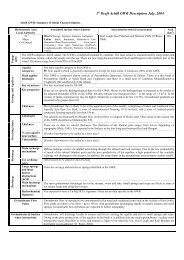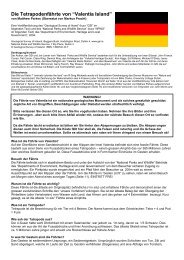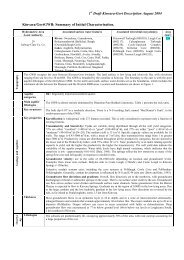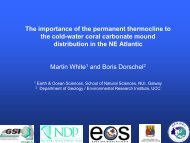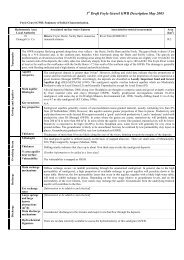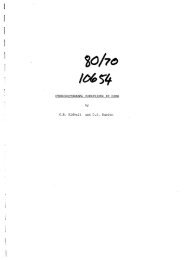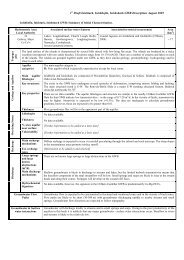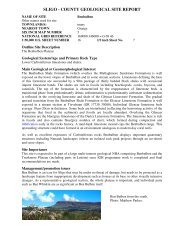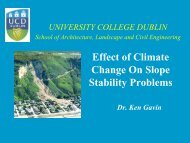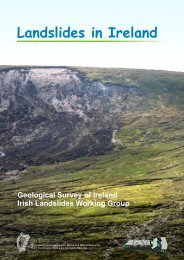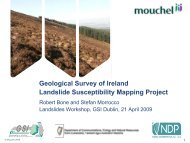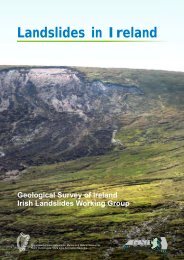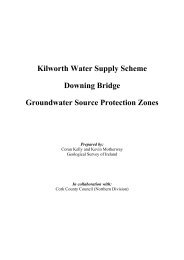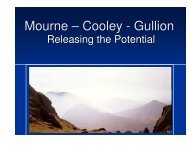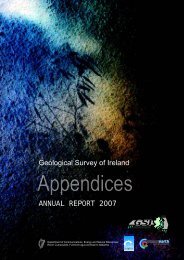PDF Download (2.6Mb) - Geological Survey of Ireland
PDF Download (2.6Mb) - Geological Survey of Ireland
PDF Download (2.6Mb) - Geological Survey of Ireland
You also want an ePaper? Increase the reach of your titles
YUMPU automatically turns print PDFs into web optimized ePapers that Google loves.
Geology Matters: Winter 2009<br />
Griffith Geoscience Research<br />
Awards<br />
EurGeol Dr. Eibhlin Doyle PGeo<br />
strategies for coping with coastal and river<br />
flooding, and it is also being applied to<br />
indentify areas susceptible to landslides.”<br />
He went on to explain that Earth<br />
Observation is primarily delivered via a<br />
mechanism <strong>of</strong> remote sensing, whereby<br />
the sensor being used is not in contact<br />
(remote) with what it’s recording (sensing).<br />
Various applications are involved in Earth<br />
Observation – land, sea, air and space<br />
– and the technologies used include<br />
satellite, ship-based and airborne.<br />
A recurring theme throughout the<br />
proceedings was <strong>Ireland</strong>’s overall<br />
importance in the global Earth Observation<br />
story. Our unique geographical position<br />
at the edge <strong>of</strong> continental Europe and<br />
the North Atlantic presents interesting<br />
challenges in acquiring Earth Observation<br />
data. Many <strong>of</strong> the presentations,<br />
delivered by a strikingly youthful band <strong>of</strong><br />
Irish scientists, demonstrated remarkable<br />
achievements in successfully negotiating<br />
these challenges.<br />
The Symposium attracted over 80<br />
delegates who, as well as gaining<br />
exposure to a wide-ranging programme<br />
<strong>of</strong> talks, were treated to two different<br />
demonstrations by GSI and the Ordnance<br />
<strong>Survey</strong> <strong>of</strong> <strong>Ireland</strong> on their work in Earth<br />
Observation. GSI unveiled its new geovisionary<br />
suite in a very well-received<br />
workshop. The Symposium’s keynote<br />
speaker was the highly respected Earth<br />
Observation expert from the British<br />
<strong>Geological</strong> <strong>Survey</strong>, Dr. Colm Jordan,<br />
himself Irish. The Symposium also touched<br />
on the work <strong>of</strong> the European Space<br />
Agency, enabling <strong>Ireland</strong> to maximise her<br />
return on investment in this organisation.<br />
Proceedings concluded with Dr. Fiona<br />
Cawkwell, UCC, announcing that UCC<br />
were hoping to convene a working group/<br />
steering committee that will consider the<br />
future directions <strong>of</strong> Earth Observation<br />
in <strong>Ireland</strong>. Further details on the<br />
symposium, including the presentations,<br />
can be found at the dedicated web-pages<br />
available here http://www.gsi.ie/News/<br />
Earth+Observation+Symposium.htm.<br />
The Griffith Geoscience Research Awards were established<br />
in 2007. The Awards are in honour <strong>of</strong> Richard Griffith, the<br />
celebrated geologist and engineer, who lived from<br />
1784 to 1878, and is credited with developing the<br />
first geological map <strong>of</strong> <strong>Ireland</strong>. In previous<br />
newsletters we have briefly discussed<br />
these awards but now we will provide<br />
more detail.<br />
The geoscience sector is an important<br />
sector to <strong>Ireland</strong>’s growth and sustainable<br />
development. The sector provides raw<br />
material for the construction industry; has<br />
a base metal industry both in mining and<br />
exploration; provides information on the nature<br />
and stability <strong>of</strong> the ground for infrastructure<br />
projects; an understanding <strong>of</strong> our groundwater<br />
and its vulnerability; and encourages tourism<br />
through Global Geopark initiatives (see Geoparks<br />
item elsewhere in this newsletter). In 2006, it is<br />
estimated that the sector was worth €4.24 billion,<br />
representing 2.24% <strong>of</strong> GNP and employed over<br />
30,000 people (1.4% <strong>of</strong> total Irish employment).<br />
Building <strong>Ireland</strong>’s capacity in the geosciences<br />
is important. There is a need to manage and<br />
understand our resources, both mineral and water,<br />
as well as succeed in new areas such as Carbon<br />
Capture and Storage (CCS - see item elsewhere<br />
in this newsletter) and renewable energy to<br />
address issues such as climate change.<br />
Investing in geoscience research is<br />
necessary to provide answers and<br />
technologies for the future. It<br />
will build <strong>Ireland</strong>’s capacity in<br />
the geoscience sector and<br />
expand the knowledge<br />
economy.<br />
Four priority research categories were identified to guide the research to be carried<br />
out under the Griffith Geoscience Research Awards scheme. These priority areas<br />
also recognised the importance <strong>of</strong> making geological data easily available and<br />
the need to make geological information more accessible to the public and create<br />
awareness <strong>of</strong> the earth beneath our feet. The four areas identified are:<br />
1.<br />
2.<br />
3.<br />
4.<br />
Open access to GSI data on a web-enabled basis.<br />
Establish an Irish Geoscience Graduate Programme on an all-island basis<br />
which will provide access to specialised post graduate geoscience courses<br />
on a modular basis.<br />
Produce and distribute geoscience outreach products (for example, DVDs,<br />
rock specimen sets, classroom posters) to primary and/or secondary<br />
schools.<br />
To conduct high quality research on key geoscience topics especially on<br />
deep geothermal energy, carbon sequestration in geological formations and<br />
groundwater resources.<br />
page 17 17



